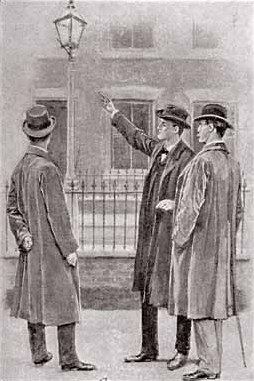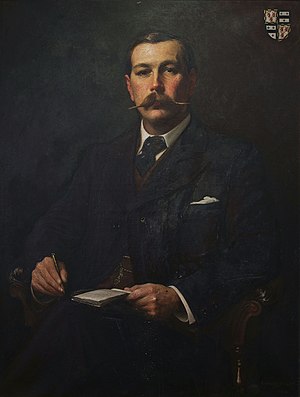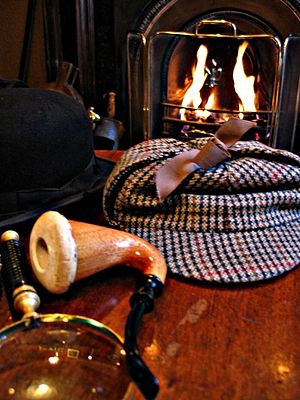 Image via Wikipedia
Image via WikipediaI think I actually started doing this in the last couple of entries. I selected Nathan Heller's review/article about the film because it's representative of all the reviews that complained about Sherlock Holmes being too action-oriented to be faithful to the Conan Doyle stories. I'm thinking now that the point I brought up last time about Watson might just explain the difference; I talked to my father about it, and he agrees (gave me a few good ideas, too). In all but a couple of the stories, Watson is the narrator, and we see everything from his point of view. For a former army officer, Watson is also pretty stuffy and judgmental -- a real Victorian, according to my dad -- and it's clear in the stories I've read so far that he doesn't tell us everything he knows that we would like to know, too. That bit I quoted from "The Musgrave Ritual" is a good example, and I think I'll use that story as my main comparison with the film. He also brushes over a lot of action, especially travel. SH really gets around, according to Watson, but the doctor just says that they went from point A to point B (and sometimes the whole rest of the alphabet) without giving any of the details of the trips or describing the places they travel through. The film, however, does NOT use Watson's point of view, and now that I think of it, I guess I've never seen a SH film that does (and thanks to my dad, I've seen plenty). I read something in one of my sources, which I guess I'll have to find now, about Watson being an "unreliable narrator." That seems to sum up the problem I see. He has his own personality quirks that lead him to criticize Holmes for various things and to praise Holmes for things that he (Watson, that is) approves of. Watson isn't ever going to talk about things he thinks should not be talked about in public, and he's not going to tell us stuff that he thinks we should already know, like what Mayfair looks like as opposed to Stepney (which he does describe, in "The Six Napoleons").
So, it appears that my thesis is being revised already! I'm not sure how to word it, but it's something like how everything Heller is noting as a deviation from the stories is only a deviation if you believe that Watson's point of view is the only point of view that matters. Well, this is going to take more thought than I thought it would.
![Reblog this post [with Zemanta]](http://img.zemanta.com/reblog_e.png?x-id=f4ccbab3-91d1-43e7-861c-a57e44772f2e)

![Reblog this post [with Zemanta]](http://img.zemanta.com/reblog_e.png?x-id=d8cd9a45-ff6d-46ca-9061-cb5cd2b069d2)

![Reblog this post [with Zemanta]](http://img.zemanta.com/reblog_e.png?x-id=5488ab87-d176-468d-a29e-e6877db34ebf)


![Reblog this post [with Zemanta]](http://img.zemanta.com/reblog_e.png?x-id=238a4c51-b991-4920-8b9a-4cfb094dc211)
![Reblog this post [with Zemanta]](http://img.zemanta.com/reblog_e.png?x-id=c6e624a5-7013-49ee-8c5d-72af626167fa)

![Reblog this post [with Zemanta]](http://img.zemanta.com/reblog_e.png?x-id=22413e1c-dea3-4328-8816-fd32f27ec3f2)